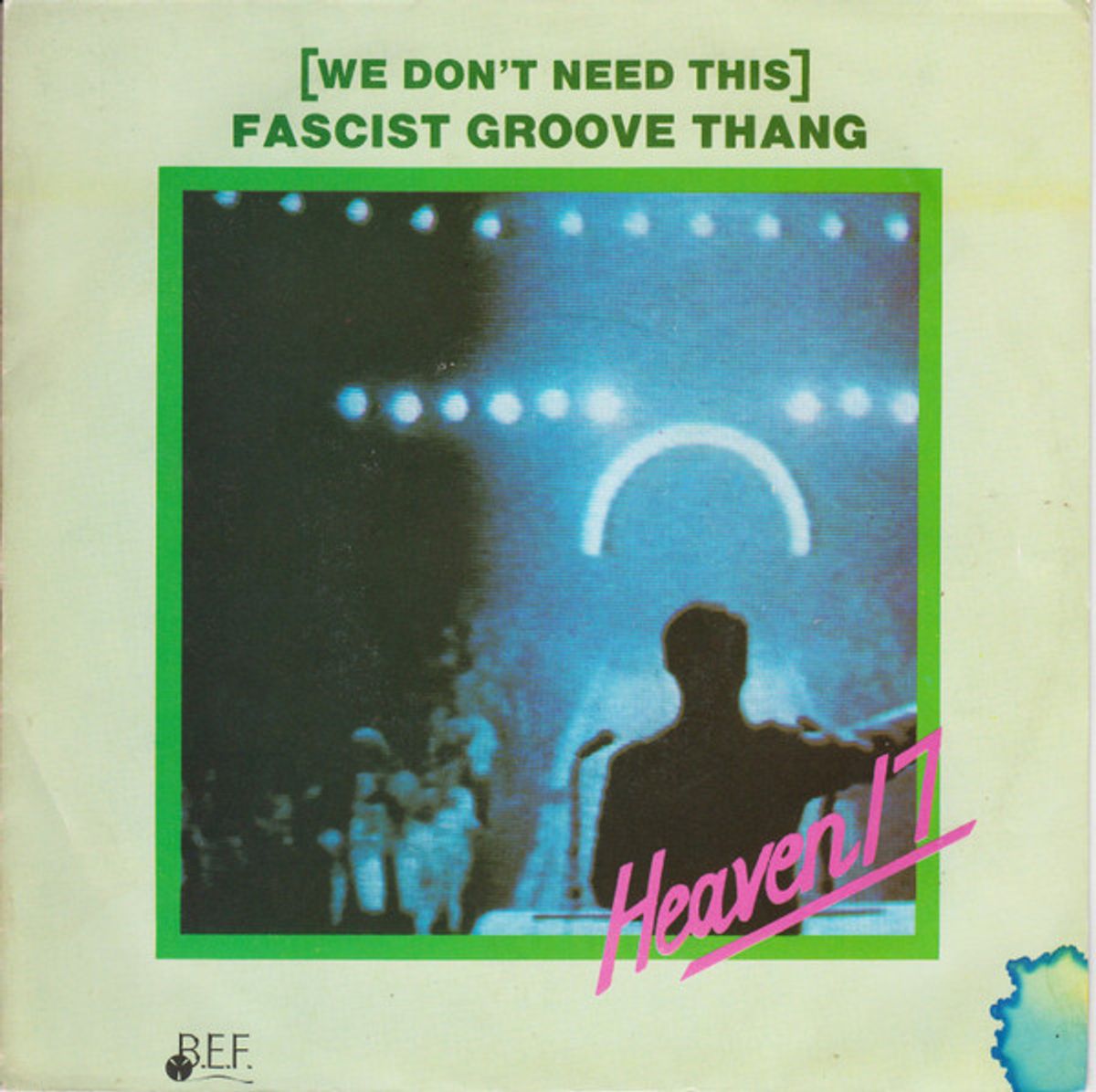#Britfunk - Heaven 17 - (We Don’t Need This) Fascist Groove Thang (1981)

De Britse jongens en meisjes gingen begin jaren tachtig van punk naar funk. Het nihilisme, dat gitzwart kleurde, werd feestelijk en enigszins escapistisch ingeruild om dansend in de ondergrond in te verdwijnen. En dat leverde onverwachte springdingen op.
De eerste single van Heaven 17 en een voltreffer die ons op een verloren zaterdag tegen middernacht werd gepresenteerd door Luc Janssen in 'Domino Deel 2', onze toenmalige favoriete duysterkabouter op de BRT Radio.
Opwindende electrofunk, die al van de eerste ritmische begintonen de ogen wijd op de dansvloer deed richten, gemaakt door twee Human League-dissidenten - Martyn Ware en Ian Craig Marsh - aangevuld met nieuwbakken zanger Glenn Gregory
Die laatste legt uit: "We wanted to do something that was funky because we loved the funk, so we started off with that as an idea: let's do this really fast. Nobody's really got anything out there that's, like, a hundred and sixtye BPM. We used the Burroughs cut up method for making lyrics, as an inspirational start anyway. There was a magazine called 'Record Mirror' in the UK that had a dance chart, or a disco chart as they called it in those days. We were all big fans of disco music, even though it was out of fashion then. But we didn't care. So we looked at all the titles. It wasn't all disco, there was some credible stuff. It ranged from stuff like, 'Let's All Chant,' to deep, more like Sly & the Family Stone-type stuff. We looked at all these titles because we loved the terminology. It was all very mysterious to us with words like hip talk, slang. That's why we came up with 'thang' as a part of the title. We were so excited to have 'thang' in there because it was a really cool word."
Uiteraard was de songtitel en bijhorende tekst een regelrechte aanval op Prime Minister Margaret Thatcher en President Ronald Reagan en hun kruisrakettenverhaal, waarbij de tekst een parodie was op slogans als “Heart USA. I Feel Your Power”. Martyn Ware: "Then, as we got more into writing the lyrics, we thought, 'Wouldn't it be great to have some real world people in there?' We were obsessed with Reagan coming into power and the specter of Margaret Thatcher coming into power and those were some very genuine concerns. The whole world was going to be blown to smithereens. It seems a little melodramatic now, but it was a genuine thing at the time if you remember. So we thought, 'It's time for action here. We're all political people. It's time to walk the walk.' So as it evolved, the songwriting – it only took two days to write – it turned into this really bizarre hybrid of politics and dancing and comedy and black American soul influence."
Uiteraard was een verbanning door de BBC hun deel, hetgeen alleen maar kon bijdragen tot het jolijt en de hitkansen nog verhoogde, want alles wat verboden werd door tante Bieb, moest wel speciaal zijn.
De sublieme baspartijen in de song waren van een tienerbassist John Wilson. De groep wilde een bassolo in de brug van de song, hetgeen ze oorspronkelijk elektronisch wilden benaderen met synthesizers en bandopnemers, hetgeen maar niet wou lukken. Zanger Gregory, die in het theater The Crucible werkte om de eindjes aan elkaar te knopen, ging op goed geluk scouten in de lobby, waar het World Snooker Tournament bezig was: 'Oh, I'll ask around because it's theatrical people, there's bound to be a musician in there somewhere.: 'Does anybody play bass?' Literally. This is not some apocryphal story. This is literally what happened. And one of the stage hands [John Wilson] was this young guy who had just started, seventeen years old. Black guy. Very shy, quiet was reading the newspaper. He put his hand up without looking up: 'I play a little bit of bass.'"
"We asked him to come down because we just wanted to see if the idea would work. He said, 'Oh, I'll go and get my bass. I just bought one last week. I bought it for twenty quid, so it's not a very good bass.' It really doesn't matter. It's just the idea. We want to see if it will work. So he came down and the first thing he played was the solo in the middle of Fascist Groove Thang and we all went, excuse my language, 'Fu--ing hell!' Literally, in my entire life my jaw's never hit the floor. All of us, we were going, 'This is phenomenal!' And so I said, 'Would you like to see if you can play some bass on the rest of the tune?' And he went, 'Sure.'"
Ware vult aan: "After he finished the bass on the track, he said, 'Is that alright?' I said, 'I think it was alright.' 'Because,' he said, 'It's not really my main instrument.' I said, 'What's your main instrument?' 'Oh,' he said, 'I'm a rhythm guitarist.' And I said, 'Do you think you might want to go home and bring your guitar in, like, right now?' So he came back in and he sat down and plugged it in. And I said, 'I think we'd like something that sounds a little bit like Chic.' I knew it would be good because this kid's got the funk, but it was on another level. I've since talked to Nile Rodgers about this and he says, 'Wow, that kid is just awesome.'"
